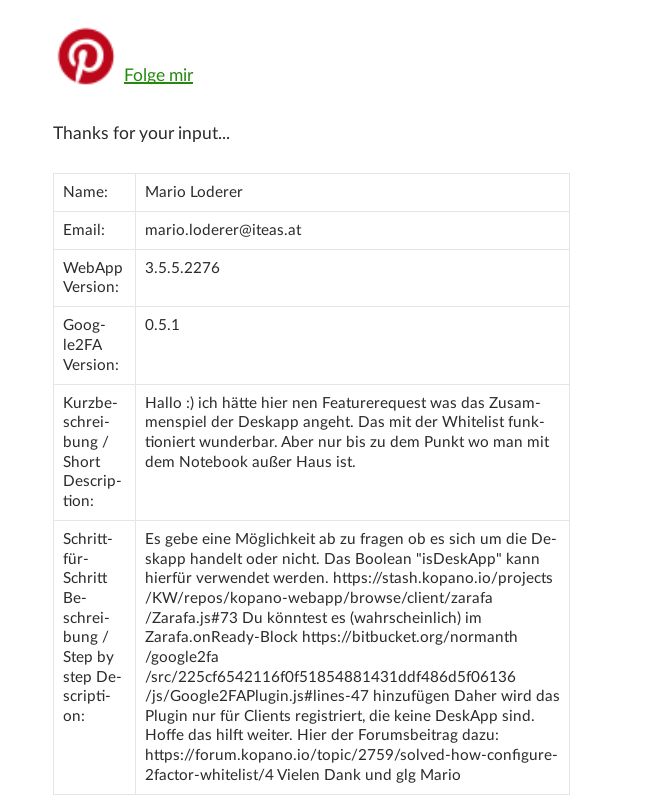[solved] How configure 2Factor whitelist?
-
The plugin creator should check if a client is DeskApp or not.
We have a Boolean in WebApp called:isDeskAppthat can be used.
https://stash.kopano.io/projects/KW/repos/kopano-webapp/browse/client/zarafa/Zarafa.js#73You can add it in (probably) the
Zarafa.onReadyblock https://bitbucket.org/normanth/google2fa/src/225cf6542116f0f51854881431ddf486d5f06136/js/Google2FAPlugin.js#lines-47So it will only register the plugin for clients that are not DeskApp.
-
Ah ok. That would probably have to program someone.
-
@boospy Contact the plugin maintainer for that.
-

-
Hi,
I am the developer of Google2FA.
The two-factor authentication runs during the login process. At this time, the JavaScript part of the WebApp is not loaded. Therefore it is not possible to use the variable isDeskApp. I was not able to detect the use of the DeskApp based on the server variables (gobal PHP variable $_SERVER - f.e. $_SERVER[HTTP_USER_AGENT]). I would be very happy about any ideas.
Some infos in german:
In der Tat ist es aktuell nur möglich die DeskApp mit aktivierter Zwei-Faktor Authentifizierung (Plugin Google2FA) zu nutzen, wenn man die Whitelist konfiguriert und dann aus dem konfigurierten IP-Bereich heraus auf den Server zugreift.
Bei der privaten Nutzung hat man in der Regel keine feste IP-Adresse und der Server steht außerhalb des lokalen Netzes. Hier hat man die Möglichkeit DynDNS zu nutzen (https://de.wikipedia.org/wiki/Dynamisches_DNS). Bei der Whitelist ist zu beachten, ob IPv4 oder IPv6 verwendet wird - im Zweifel fügt man beide Varianten hinzu:
define('PLUGIN_GOOGLE2FA_WHITELIST', gethostbyname('hier.dns.eintragen') . "," . dns_get_record('hier.dns.eintragen', DNS_AAAA)[0]["ipv6"] . "/64");Eine Verwendung der Variablen isDeskApp ist nach meinem Verständnis nicht möglich, denn während des Login-Prozesses, wenn die Prüfung der Zwei-Faktor Authentifizierung läuft, ist der Javascript-Teil der WebApp noch nicht geladen. Zudem würde eine Nicht-Registrierung des Plugins bei der Verwendung der DeskApp dafür sorgen, dass man über die DeskApp die Zwei-Faktor Authentifizierung nicht mehr konfigurieren kann.
Anhand der Servervariablen beim Login ist es mir bisher nicht gelungen zu erkennen, ob die DeskApp als Browser verwendet wird - zum Beispiel mit Hilfe von $_SERVER[HTTP_USER_AGENT].
[HTTPS] => on [SSL_TLS_SNI] => www.hierdieurl.de [HTTP_HOST] => www.hierdieurl.de [HTTP_CONNECTION] => keep-alive [HTTP_CACHE_CONTROL] => max-age=0 [HTTP_UPGRADE_INSECURE_REQUESTS] => 1 [HTTP_USER_AGENT] => Mozilla/5.0 (Windows NT 10.0; Win64; x64) AppleWebKit/537.36 (KHTML, like Gecko) Chrome/77.0.3865.120 Safari/537.36 [HTTP_SEC_FETCH_MODE] => navigate [HTTP_SEC_FETCH_USER] => ?1 [HTTP_ACCEPT] => text/html,application/xhtml+xml,application/xml;q=0.9,image/webp,image/apng,*/ *;q=0.8,application/signed-exchange;v=b3 [HTTP_SEC_FETCH_SITE] => same-origin [HTTP_REFERER] => https://www.hierdieurl.de/webapp/ [HTTP_ACCEPT_ENCODING] => gzip, deflate, br [HTTP_ACCEPT_LANGUAGE] => de-DE,de;q=0.9,en-US;q=0.8,en;q=0.7 [HTTP_COOKIE] => encryption-store-key=b3e843dc510c49731ed437e106ac3859; KOPANO_WEBAPP=fbmb9j08r457sifi4i2e9bqth3 [PATH] => /usr/local/sbin:/usr/local/bin:/usr/sbin:/usr/bin:/sbin:/bin [SERVER_SIGNATURE] => <address>Apache/2.4.10 (Debian) Server at www.hierdieurl.de Port 443</address> [SERVER_SOFTWARE] => Apache/2.4.10 (Debian) [SERVER_NAME] => www.hierdieurl.de [SERVER_ADDR] => 83.169.xxx.xxx [SERVER_PORT] => 443 [REMOTE_ADDR] => 84.191.yyy.yyy [DOCUMENT_ROOT] => /var/www/html/wordpress.hierdieurl.de [REQUEST_SCHEME] => https [CONTEXT_PREFIX] => /webapp [CONTEXT_DOCUMENT_ROOT] => /usr/share/kopano-webapp [SERVER_ADMIN] => norman@hierdieurl.de [SCRIPT_FILENAME] => /usr/share/kopano-webapp/index.php [REMOTE_PORT] => 56374 [GATEWAY_INTERFACE] => CGI/1.1 [SERVER_PROTOCOL] => HTTP/1.1 [REQUEST_METHOD] => GET [QUERY_STRING] => [REQUEST_URI] => /webapp/ [SCRIPT_NAME] => /webapp/index.php [PHP_SELF] => /webapp/index.php [REQUEST_TIME_FLOAT] => 1571248933.149 [REQUEST_TIME] => 1571248933Vielleicht hat jemand noch eine Idee hierzu…
Gruß, Norman
-
Does this change help? https://stash.kopano.io/projects/KD/repos/kopano-deskapp/browse/src/package.json#59
-
Thanks marty!!! A very good hint!!! That’s exactly the change I needed…
With a new DeskApp version (DeskApp version newer than 2019-05-21, f.e. version 2.4.5) and a change in Google2FA plugin, the two-factor authentication can be disabled when the DeskApp client is used. A first test was successful.
php/plugin.google2fa.php:56ff additional code:
if (strpos($_SERVER[HTTP_USER_AGENT], " KopanoDeskapp/") !== false) break;In the Google2FA configuration file I will create an option to activate this function.
Of course, the activation poses a risk as it offers the opportunity to bypass the two-factor authentication.I will create a new Google2FA version in the next days.
Thanks, Norman
-
The new Google2FA version is available:
- Port configuration for MySQL
- Function to use DeskApp without two-factor authentication
- Fix problem with using trusted proxies
-
@norman If you like, you could also make a PR for DeskApp for support for your plugin support.
-
@norman Really, really nice! So fast, and works like a charm.
Good work! Thank very much.